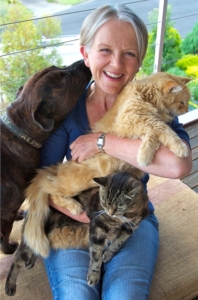How animals help us to heal and find meaning and purpose in life
How animals help us to heal and find meaning and purpose in life

by June Alexander
I don’t need to read research papers to know that pets are good for me. For me and many others, animals contribute to feelings of well-being. They teach about love and living in the moment. They are a best buddy in coping with illness, relationship breakups, grief, employment disappointments, and much, much more.
The picture shared today shows cats Ginger and Dora, who each gave joy and comfort for 13 years, and my first Staffordshire puppy, Harley, whose love was always uplifting. Today my non-human-family comprises one English Staffordshire puppy, Maisie, and two rescue cats, Benji and Fizzie. None of these pets are yet one year old, and yet each is already excelling as a life coach. They haven’t needed years of tertiary study to know how to assist in easing anxiety, warding off dark thoughts, lowering blood pressure and connecting with self and others. They just do it.
Animal friends come in all shapes and sizes
Growing up on a dairy farm, I wanted but was not allowed to have a dog, because they were considered work animals only. Cats were allowed, as they were helpful for keeping the mice population down. Pets were not allowed in the house, but from age 10 when I slept on the wooden veranda during summer, my cats would hop under the bedcovers, and I remember this comfort to this day.
Other childhood pets included canaries, whose home was a large aviary my grandfather built on the veranda, and tadpoles, whose eggs I sourced from a nearby gully after rains, and which all too soon became little wiggly things with tail, then legs, then no tail and then out they would leap, out of the safety of their small water bucket on the veranda to an uncertain freedom in my mother’s flower garden. I also had pet snails, selected from under damp leaves of lilies and other large plants. Using small, discarded seedling boxes, I would set up a little fortress-like home, complete with juicy leaves from my mother’s plants. This venture, like that of the frogs, was short-lived as the snails had an uncanny way of escaping, slithering away, leaving a slimy, silvery trail, during the dark of the night.
Learning to love and to grieve
At age 13, a wallaby, Jaddy, entered my life. City cousins visiting the farm during the summer vacation had gone hunting and had shot Jaddy’s mother. They found this tiny babe in the mother’s pouch and carried it home. My mother placed the orphan into a teapot cosy, fed it with an eye dropper and kept it warm near our wood stove. Soon I was able to help with the feeding and within weeks Jaddy was hopping around the kitchen. By the time I return to classes for a new school year, Jaddy was bounding around, exploring the house garden.
Jaddy taught me one of the toughest lessons in life. One evening after school, my dad, a man of few words, came and sat beside me and explained that Jaddy had jumped the garden fence into the house paddock, and there my horse had kicked it, causing death.
Love and grief, go together. If we don’t love, we cannot grieve. We need to allow ourselves to do both. Jaddy, who helped me to learn to love and to grieve, has a special place in my heart forever.
Healing and feeling safe
The close relationship that was nurtured with animals in childhood took on a vital role in adulthood, in helping me to heal from a long term eating disorder, from abusive and dysfunctional relationships, and the emotional despair of rejection and alienation from my family of origin.
My treatment team encouraged me to embrace the bond that pets offer in healing and feeling safe. Many a time, during painful revelations, I would sit on the floor, hugging my pets and howl into their fur. They would lick the stream of salty tears from my face, snuggle up close, letting me know in their own special way that “everything will be all right. Maybe not right now. But eventually. So hang in there, June. We love you, and we want you, and we are part of your family.”
Unlike the house of my childhood, my home today is an ”open-house.” My pets are allowed inside. They sleep on my bed, they loaf on my sofa, they are sitting at my feet while I write this to you, and they all but sit at the dining table at meal-times. They are part of my family.
I love my children and grandchildren. But they have lives of their own and my pets are with me 24/7. They fill the gaps. They never reject or judge. They give purrs and tail wags; they love, love, love.
Growing recognition that animals contribute to mental health
Just as there is a growing recognition that our stories can be helpful in the healing process, so too there is growing recognition of the role of animals in developing and supporting feelings of wellness.
A 2018 paper, titled The power of support from companion animals for people living with mental health problems (Brooks et al.) explores the comprehensive role of companion animals and how pets can help people living with a long-term mental health condition. People with companion animals can feel an intense connectivity with their pets, particularly in times of crisis. Benefits are found to far outweigh the negative aspects of keeping a pet, and further research is called for, to explore the range of roles and types of supports that pets confer in relation to mental health.
Social and relationship interaction
Findings in a randomized controlled study on the use of Animal-Assisted Therapy (AAT) in adolescents with acute mental disorders (Stefanini et al., 2015) lead to the conclusion that the benefits of animal-assisted therapy are not only related to a promotion of well-being, but may contribute to the processes of social and relational integration even for psychiatric patients facing severe challenges.
One possible explanation for this success is the role of the animal as a catalyst in the therapeutic process. Animals have ability to encourage social interactions and to create a more relaxed environment. Every time I take Maisie for a walk, we meet someone to talk to. Often, elderly men will stand at their front gate, waiting to say ‘hi’ to Maisie while on her regular morning walk. She always rewards them with a fast tail wag and loving licks. The study recommends more research on animal-assisted therapy, for instance to more deeply explore the particular relationship between animal and young psychiatric patients.
The benefit of this relationship between animal and child is noted to be mainly behavioral, but also emotionally warm and welcoming, without being judgmental or demanding. Furthermore, the young patients who feel fragile, needy and dependent on others in the hospital context, can experience themselves as caretakers of someone else. This experience can improve their sense of self-agency and self-cure. Moreover, these positive effects can extend beyond the humane animal bond to the patient’s global functioning and to the entire process of care. Our pets give us purpose and reward us many times over.
Overcoming the ‘it’s only an animal’ mindset
So, animals are being shown to be beneficial for our mental and emotional well-being both in the home and in the healthcare environment. However, there is a call for more to be done.
In a paper exploring human-animal bonds, and the relational significance of companion animals, Froma Walsh (2009) concludes that human-animal bonds deserve more attention in the field of mental health, especially in connection with families and relationships. Evidence has increased on the ability of companion animals to provide important psychological, physiological and relational benefits, but a gap remains in the mental health field. Sometimes the answers are right there in front of us, and it is not complicated.
Overcoming the dismissive “it’s only an animal” mindset, Walsh postulates, will enable clinical practice to a more holistic and open-minded view of the potential contribution of animal bonds to human healing and well-being.
As a “wounded” human being from early childhood, I can vouch for the benefits of animals and their contribution to well-being. They help me to live in the moment, they make me laugh, they encourage interaction with others (Maisie is forever adding new fans to her list of friends encountered on our walks), they give affection, they are loyal, they bring comfort and help me to feel safe and secure. My experience leads me to agree with Walsh that “bonds with companion animals may not be our whole lives, but they can make our lives whole”.
- Next week, Shannon Cutts will share exciting news about her pet parrot, Pearl, and describe invaluable life lessons acquired through sharing her home with Pearl and two other non-humans.
- If you would like to share your experience with pets in your life, write to june@junealexander.com
References
Brooks H, Rushton K, Lovell K, Bee P, Walker L, Grant L, & Rogers A (2018). The power of support from companion animals for people living with mental health problems: A systematic review and narrative synthesis of the evidence. Bmc Psychiatry, 18(1), 31.
Stefanini M C, Martino A, Allori P, Galeotti F, & Tani F (2015). The use of Animal-Assisted Therapy in adolescents with acute mental disorders: A randomized controlled study. Complementary therapies in clinical practice, 21(1), 42-46.
Walsh, F (2009), Human‐Animal Bonds I: The Relational Significance of Companion Animals. Family Process, 48: 462-480. doi:10.1111/j.1545-5300.2009.01296.x





